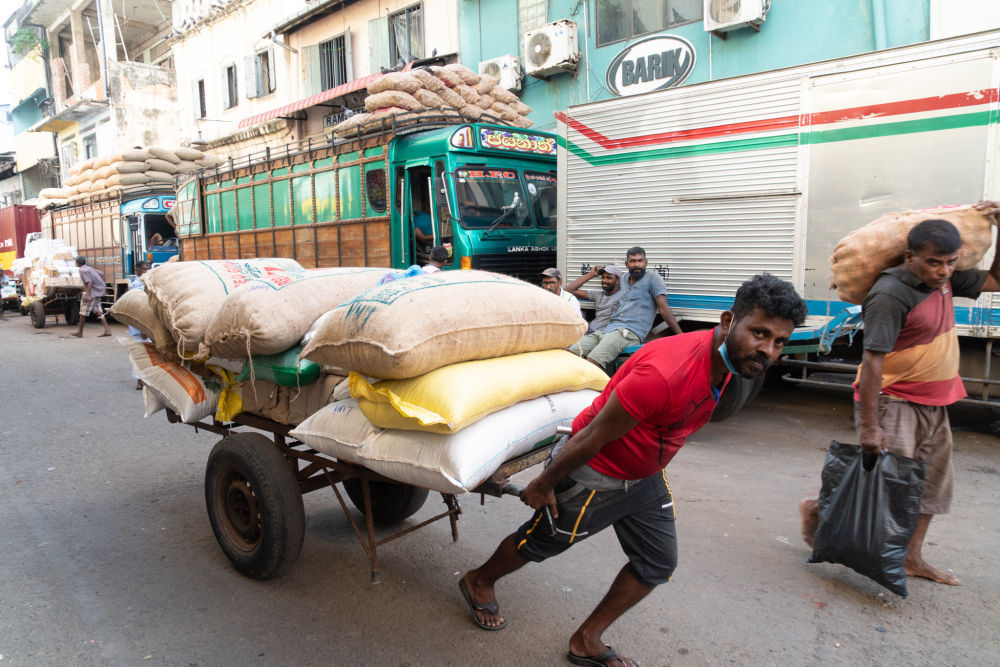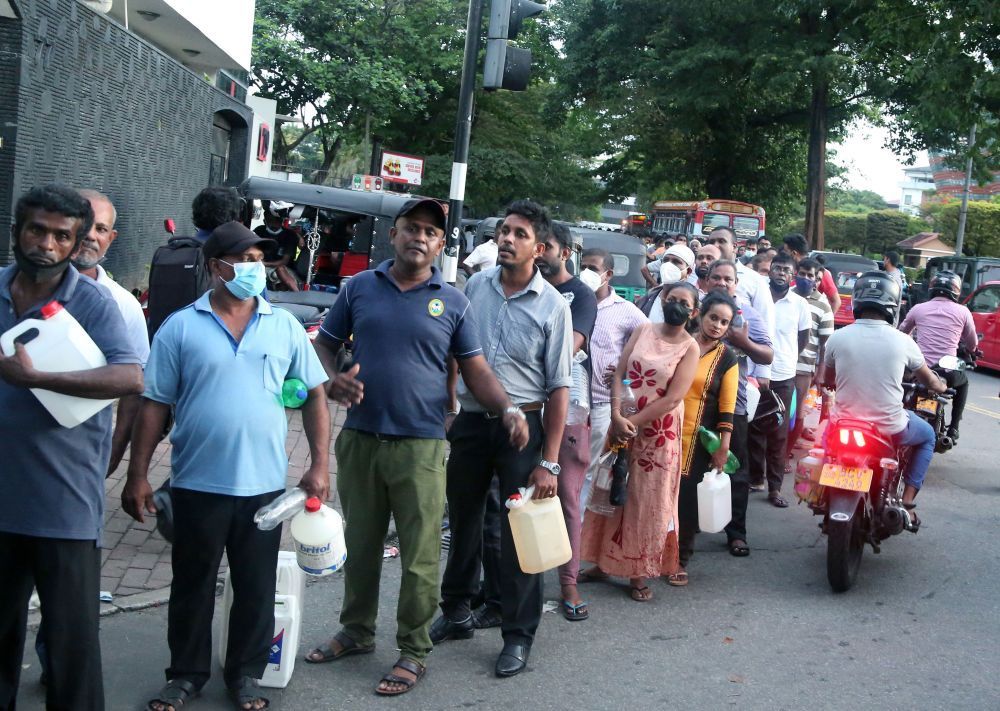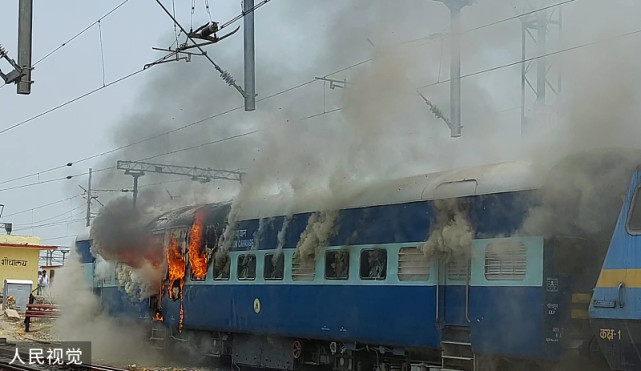The state entered an emergency, and the Prime Minister ordered a curfew in a province ... Why did the situation in Sri Lanka fall into turbulence?
Author:Daily Economic News Time:2022.07.13
According to CCTV News, according to Agence France -Presse, Sri Lanka announced that the country has entered an emergency.
According to local media reports on July 13, the Prime Minister of Sri Lanka ordered a curfew in the western province of the country.
According to the BBC, Sri Lanka President Gota Baya Rajapaksa left the country in the early morning of July 13, local time. According to French new reports, Gota Baya Rajapaksa has now arrived in the Maldives.
Earlier, Gotapa Rajapaksa promised to resign on July 13 and signed a resignation letter.
In addition, President's younger brother and former financial minister Bahil Rajapaksa have also left to the United States.

On May 21st, workers moved goods in Beta Market in Karonbo, Sri Lankan. Picture source: Xinhua News Agency
Xinhua News Agency, Sri Lanka Speaker Abyvadner said on the 11th that the Sri Lanka will elected a new president on the 20th of this month.
Abervadner said in a statement that the Sri Lang party leaders held a meeting on the same day. According to the decision reached by the meeting, the parliament will hold a meeting on the 15th. On the 19th, it was nominated by the presidential candidate. On the 20th, the new president was elected. The new president will be responsible for the establishment of the government participating in each party.
CCTV News According to local media reports, Sri Lanka's opposition leader Sagite Preda Madasa said on the 11th local time that it will organize a new government to regain the national economy.
According to Xinhua News Agency, Sri Lanka's capital Colombo broke out on the 9th. The turbulence of the Sri Lanka will continue in the short term, because of its long -term accumulation.
Since the beginning of this year, Sri Lanka has a serious shortage of food, oil and gas, and drugs. Food prices have risen sharply, inflation has continued to intensify, and the economy is on the verge of collapse. The Sri Lanka had previously announced the "bankruptcy", the school was also forced to close, and the people were dissatisfied with their emotions. According to the World Grain Program, more than 6.2 million people are facing food shortages in the country's population of about 22 million, and about 61%of families have to reduce food consumption.
In May of this year, then Prime Minister Maxinda Rajapaksa resigned, and then Vikra Marinha served as the Prime Minister. However, this has not been able to resolve the dilemma facing the country's economy. Professor Jia Yada Wangogoda, Professor of Political Science, University of Colombo, said that in the face of a worsening economic crisis, the Sriors Bureau may face more uncertainty in the future, and new leaders in the future will also face severe challenges.
Analysts believe that the economic situation of Sri Lanka has deteriorated in recent years, which is the result of the common role of internal and external factors.

On May 19th, the public lined up in front of a gas station in the Coronapu of Sri Lanka and waited to buy kerosene. Picture source: Xinhua News Agency
In terms of Neyo, Sri Lanka has suffered British colonial rule. The relics of the colonial economy have led to the country's economy still seriously relying on a few crops such as tea and rubber. The single economic structure has led to its weak ability to resist risks. In 2021, the Sri Lanka promoted the disable of chemical fertilizer for the development of organic agriculture. Although the ban has been relaxed in the dissatisfaction of the public since then, according to experts, the ban reduced the annual output of Sri Lao about 43%, and the export of economic crops such as rubber, coconut, and tea decreased by 40%. Many farmers have lost their income sources. The reduction of crop production has led to soaring food prices, a large number of people's lives are in trouble, and the impact of low -income groups has more impact.
In terms of external causes, Sri Lanka's economy is largely dependent on foreign exchange income, and its production materials and necessities are highly dependent on imports. Tourism is one of the main sources of Sri Lanka. After the new crown epidemic was outbreak, the number of international tourists from Laisi Tourism fell. Although the overall situation improved in 2021, it was not as good as the pre -epidemic level. Affected by the epidemic, another important pillar of Sri Lanka's foreign exchange -overseas migrant workers also decreased significantly. The overlapping of the two has led to a significant reduction in foreign exchange income. According to data from the Ministry of Finance of Sri Lanka in May this year, the country's use of foreign exchange reserves has dropped to less than 50 million US dollars.
Since February of this year, factors such as the upgrading of the Ukraine crisis have led to the continuous rise in global food and energy prices, making it more difficult for Sri Lanka, which was already tight foreign exchange, to import sufficient food and energy, which has continued to deteriorate its domestic inflation. Sri Lanka's inflation rate reached 54.6%of the record in June, and the inflation rate of food was as high as 80.1%. Vikra Masinger said in early July that the country's inflation rate will reach 60%in the next few months.
The Portuguese "Public" Daily website recently said that "the problem of Sri Lanka has its own characteristics and is mainly caused by internal causes, but its collapse is also inseparable from a series of intricate global phenomena."
Daily Economic News Integrity From CCTV News, Xinhua News Agency
Daily Economic News
- END -
Indian recruitment reform caused fierce protests. 369 trains were suspended.

According to the British Guardian reported on the 19th, since the Indian governmen...
Ministry of Commerce: Promoting the BRICS mechanism has become a accelerator for global economic recovery and sustainable development
Xinhua News Agency, Beijing, June 25 (Reporter Xie Xiyao) Wang Shuowen, deputy minister of the Ministry of Commerce and deputy representative of international trade negotiations, said on the 24th that